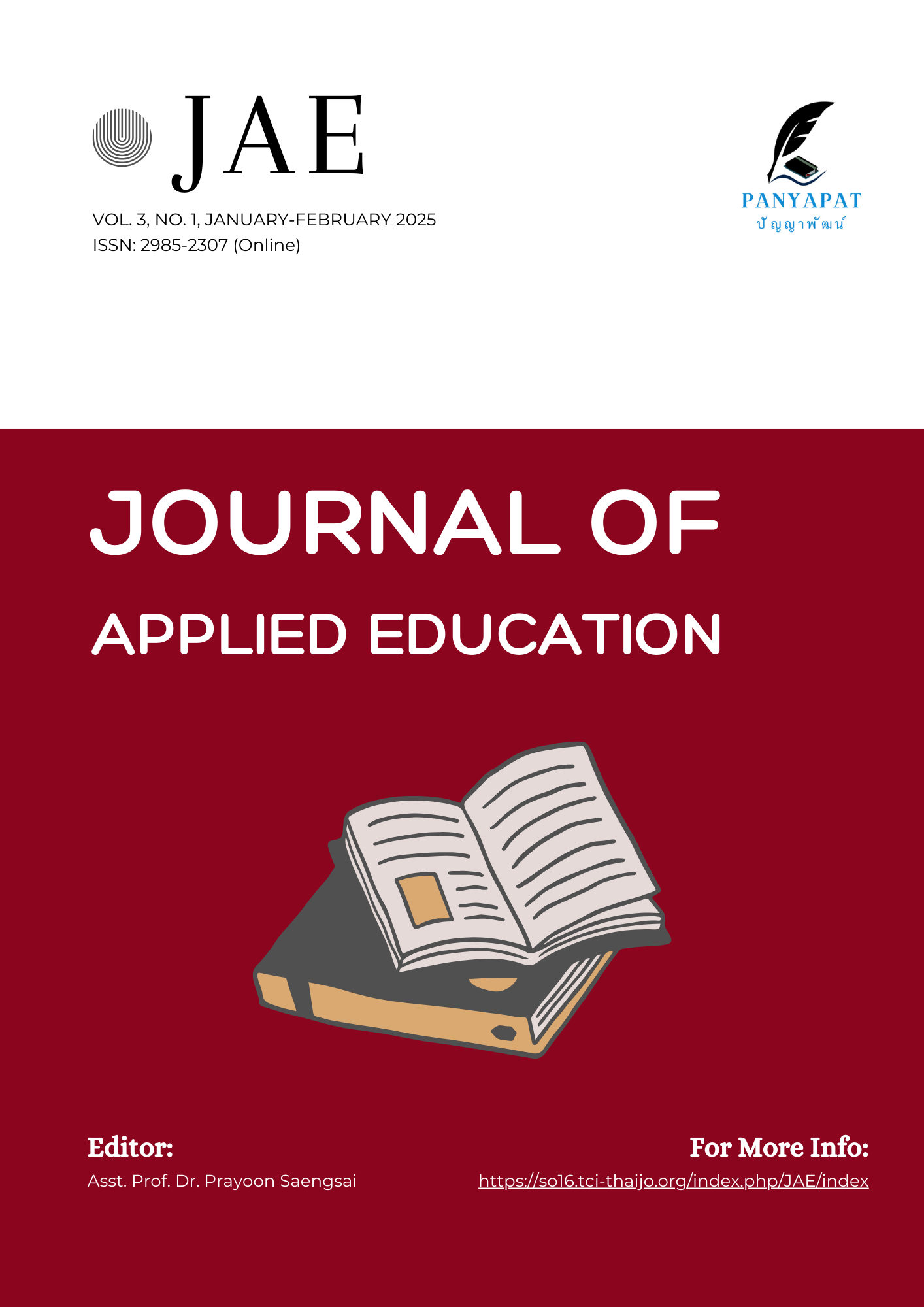The Effects of Phenomenon-Based Learning Activities on Natural Disasters, Integrated with Online Applications, on Academic Achievement and Critical Thinking Skills of Grade 12 Students
Main Article Content
Abstract
This research article aims to (1) compare students’ academic achievement and critical thinking skills before and after learning through phenomenon-based learning (PhBL) integrated with online applications, (2) compare the academic achievement and critical thinking skills of students taught using PhBL with online applications and those taught using a conventional learning approach, and (3) examine students’ satisfaction with PhBL integrated with online applications. The sample consisted of 62 Grade 12 students from Hantharangsri Prachasarn School, selected using cluster random sampling. This study employed a quasi-experimental research design with an experimental group and a control group. The research instruments included (1) a lesson plan based on PhBL integrated with online applications, (2) a conventional lesson plan, (3) a critical thinking skills test, (4) an academic achievement test, and (5) a student satisfaction questionnaire. The data were analyzed using mean, standard deviation, and dependent and independent t-tests. The research findings revealed that: 1) Students who received PhBL integrated with online applications showed significantly higher academic achievement and critical thinking skills after the intervention at the .05 level. 2) Students taught using PhBL integrated with online applications had significantly higher academic achievement and critical thinking skills than those taught using the conventional approach at the .05 level. 3) Students expressed the highest level of satisfaction with the PhBL integrated with online applications.
Article Details

This work is licensed under a Creative Commons Attribution-NonCommercial-NoDerivatives 4.0 International License.
References
กชกร แฝงเมืองคุก. (2564). ผลการจัดกิจกรรมการเรียนรู้วิทยาศาสตร์โดยใช้แนวคิดปรากฏการณ์เป็นฐานที่มีต่อความสามารถในการคิดอย่างมีวิจารญาณของนักเรียนมัธยมศึกษาตอนปลาย. (ครุศาสตรมหาบัณฑิต, จุฬาลงกรณ์มหาวิทยาลัย).
กามีละห์ มะยุ. (2565). การพัฒนาทักษะการคิดแก้ปัญหาโดยใช้การจัดการเรียนรู้ปัญหาเป็นฐาน สาระการเรียนรู้อัลฟิกฮฺ เรื่อง หัยฎและอิสติฮาเฎาะฮฺ สำหรับนักเรียน ชั้นอิสลามศึกษาตอนกลางปีที่ 1. (ครุศาสตรมหาบัณฑิต, มหาวิทยาลัยราชภัฏยะลา).
ณัฐกานต์ แสงทอง. (2564). การประเมินปัญหาผลสัมฤทธิ์ทางการเรียนในหัวข้อภัยพิบัติทางธรรมชาติ. วารสารการศึกษาสังคมศึกษา, 12(3), 85-92.
ดลธรัตน์ จูฑะมณีโรจน์. (2564). การพัฒนาเว็บแอปพลิเคชันร่วมกับการเรียนการสอนโดยใช้การตัดสินใจเป็นฐาน เพื่อส่งเสริมการประเมินเหตุผลสำหรับนักศึกษาแพทย์ชั้นพรีคลินิก. (ครุศาสตรมหาบัณฑิต, จุฬาลงกรณ์มหาวิทยาลัย).
ทัณฑธร จุ้ยสวัสดิ์. (2564). การวิจัยเชิงปฏิบัติการในการจัดการเรียนรู้โดยใช้ปรากการณ์เป็นฐาน เรื่อง จลนศาสตร์เคมี ของนักเรียนชั้นมัธยมศึกษาปีที่ 5 เพื่อส่งเสริมผลสัมฤทธิ์ทางการเรียนและทักษะการคิดอย่างมีวิจารณญาณ. (การศึกษามหาบัณฑิต, มหาวิทยาลัยบูรพา).
ทิศนา แขมมณี. (2554). การพัฒนาทักษะการคิดในศตวรรษที่ 21. กรุงเทพฯ: มหาวิทยาลัยธรรมศาสตร์.
ธนวัต สุขจิตร. (2566). การพัฒนาบทเรียนออนไลน์ด้วย Glide App เรื่อง กระบวนการออกแบบเชิงวิศวกรรม สำหรับนักเรียนระดับชั้นมัธยมศึกษาปีที่ 1 โรงเรียนขาณุวิทยา. (การศึกษามหาบัณฑิต, มหาวิทยาลัยนเรศวร).
พิชาภา ด้วงสงค์. (2565). การพัฒนาความสามารถในการคิดอย่างมีวิจารณญาณและผลสัมฤทธิ์ทางการเรียนของนักเรียนชั้นมัธยมศึกษาปีที่ 1 เรื่อง สารรอบตัว โดยการจัดการเรียนรู้แบบใช้ปัญหาเป็นฐานร่วมกับผังกราฟิก. (ครุศาสตรมหาบัณฑิต, มหาวิทยาลัยราชภัฏสกลนคร).
พิพัฒน์พงษ์ ดำมาก. (2564). การศึกษาผลการจัดการเรียนรู้โดยใช้ปรากฏการณ์เป็นฐาน เพื่อพัฒนาทักษะการคิดวิเคราะห์และผลสัมฤทธิ์ทางการเรียน. (การศึกษามหาบัณฑิต, มหาวิทยาลัยศรีนครินทรวิโรฒ).
ศศิวิมล สุนันตะ. (2565). ผลการจัดกิจกรรมการเรียนรู้โดยใช้ปรากฏการณ์เป็นฐานออนไลน์ร่วมกับเทคนิคการตั้งคำถามที่ส่งผลต่อการคิดอย่างมีวิจารณญาณของนักเรียนชั้นมัธยมศึกษาปีที่ 2. (ศึกษาศาสตรมหาบัณฑิต, มหาวิทยาลัยศิลปากร).
ศิริพร อักษรแก้ว. (2563). การศึกษาผลสัมฤทธิ์ทางการเรียนและการคิดวิเคราะห์ในวิชาสังคมศึกษา ระดับมัธยมศึกษา. กรุงเทพฯ: การศึกษา.
สำนักงานคณะกรรมการการศึกษาขั้นพื้นฐาน. (2560). หลักสูตรแกนกลางการศึกษาขั้นพื้นฐาน พุทธศักราช 2551 (ฉบับปรับปรุง พ.ศ. 2560). กรุงเทพฯ: กระทรวงศึกษาธิการ.
สุชานันท์ วรวัฒนานนท์. (2565). การจัดการเรียนรู้แบบปรากฏการณ์เป็นฐาน เพื่อพัฒนาทักษะการคิดอย่างมีวิจารณญาณและการแก้ปัญหา เรื่อง ปรากฏการณ์ของโลกและภัยธรรมชาติ ของนักเรียนชั้นประถมศึกษาปีที่ 6. (การศึกษามหาบัณฑิต, มหาวิทยาลัยนเรศวร).
หัสวนัส เพ็งสันเทียะ. (2563). ผลการจัดการเรียนรู้โดยใช้ปรากฏการณ์เป็นฐานที่มีต่อการคิดอย่างมีวิจารณญาณ และการคิดสร้างสรรค์ของนักเรียนชั้นมัธยมศึกษาปีที่ 6. (การศึกษามหาบัณฑิต, มหาวิทยาลัยศรีนครินทรวิโรฒ).
อรพรรณ บุตรกตัญญู. (2561). การจัดการเรียนการสอนโดยใช้ปรากฏการณ์เป็นฐาน: แนวทางการศึกษาในศตวรรษที่ 21. กรุงเทพฯ: มหาวิทยาลัยราชภัฏพระนคร.
Adipat, S. (2024). Transcending traditional paradigms: the multifaceted realm of phenomenon-based learning. Retrieved form www.frontiersin.org/journals/education/articles/10.3389/feduc.2024.1346403/full.
Dewey, J. (1938). Experience and Education. New York: Kappa Delta Pi.
Ennis, R. H. (1985). A logical basis for measuring critical thinking skills. Educational leadership, 43(2), 44-48.
Facione, P. A. (2013). Critical thinking: What it is and why it counts. Millbrae, CA: Insight Assessment.
Krokfors, L., et al. (2014). Integrated learning through phenomena: A Finnish educational model. Journal of Learning Studies, 3(4), 310–317.
Lehtonen, M., Sébastien, L., & Bauler, T. (2016). The multiple roles of sustainability indicators in informational governance: between intended use and unanticipated influence. Current Opinion in Environmental Sustainability, 18, 1-9.
O'Reilly, C., Devitt, A., & Hayes, N. (2022). Critical thinking in the preschool classroom-A systematic literature review. Thinking skills and creativity, 46, 101110.
Sani, A. (2020). Phenomenon based-learning for Nigerian higher institutions: A new curriculum approach to meet the challenges of the 21st century. ATBU Journal of Science, Technology and Education, 8(1), 1-10.
Symeonidis, V., & Schwarz, J. F. (2016). Phenomenon-based teaching and learning through the pedagogical lenses of phenomenology: The recent curriculum reform in Finland. Forum Oświatowe, 28(2), 31–47.
Tongsoong, S., & Jermtaisong, R. (2021). Learning management through the combination of STEAM Education and phenomenon-based learning to develop creative thinking of secondary 6 (grade 12) students. In 6th UPI International Conference on TVET 2020 (TVET 2020) (pp. 341-345). Paris: Atlantis Press.
Zulyusri, Z., Elfira, I., Lufri, L., & Santosa, T. A. (2023). Literature study: Utilization of the PjBL model in science education to improve creativity and critical thinking skills. Jurnal Penelitian Pendidikan IPA, 9(1), 133-143.

